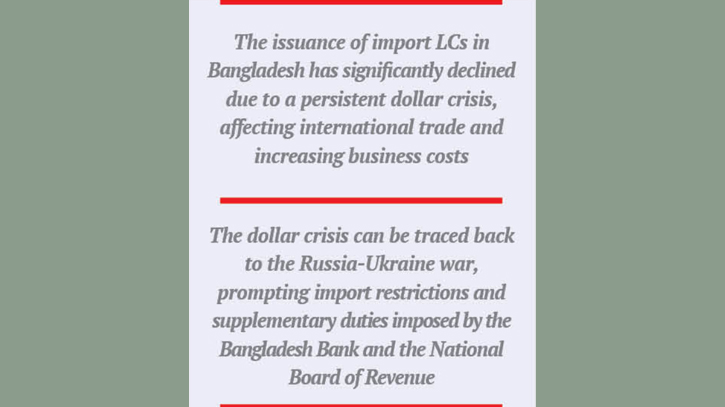
Photo : Messenger
The issuance of import Letters of Credit (LCs), vital for international trade, is dwindling due to various factors, including stringent import regulations and the mandatory 100 percent margin requirement.
Experts opine that this has happened as for more than a year and a half, country has grappled with a persistent dollar crisis, and the situation is taking a toll on businesses.
This crisis has forced many business owners to seek raw materials within the country, albeit at higher prices, as they are unable to import these materials from abroad in a timely manner. Consequently, the cost of conducting business is steadily and inexorably on the rise. The root of this crisis can be traced back to the Russia-Ukraine war that erupted in February of the previous year.
The Bangladesh Bank responded by imposing import restrictions, and the National Board of Revenue (NBR) introduced supplementary duties to discourage the import of luxury goods. Despite these measures, the dollar crisis lingers, challenging the resilience of the Bangladeshi economy.
Businesses are now confronted with the arduous task of securing the necessary volume of dollars from banks, leading to delays in LC payments. These delays result in additional interest expenses, further exacerbating the cost of doing business.
In some instances, importers are forced to procure dollars at premium rates from exporting firms to meet their import obligations, compounding their financial burdens. According to data from the Bangladesh Bank, the issuance of import LCs has experienced a significant decline due to the dollar crisis.
In September, LC openings plunged by 16.1 percent compared to the previous month, reaching the lowest point in 35 months. LC settlements for that month amounted to $4.37 billion, marking the lowest figure since October 2020. Banks initiated LCs worth $4.69 billion in September, down from $5.59 billion in August.
Monir Ahmed, the Managing Director of Asiatic Laboratories Limited, lamented and told The Daily Messenger, "The issuance of LCs has nearly ground to a halt due to the dollar crisis, resulting in a substantial reduction in our production capacity."
Expressing his frustration, he added, "While criticism is often directed at businessmen, few acknowledge the challenges we face in the current economic context. Even the banks are not providing adequate support, leaving businessmen with few allies."
An unnamed Managing Director of a private bank, in told The Daily Messenger, “Many banks have reduced LC issuances over the past year to alleviate the mounting pressure on the nation's dollar reserves. Most payments now involve deferred LC payments opened six months prior, and sight LCs have nearly disappeared from the business landscape.”
The official further elaborated that a scarcity of dollars has hindered banks from issuing sight LCs.
Economists have noted that the condition of Bangladesh's economy can be predicted by monitoring the number of LC issuances. The issuance of LCs for capital machinery and intermediate goods has significantly decreased due to the dollar shortage. This has left numerous entrepreneurs unable to secure LCs with a 100 percent margin, and even when commercial banks do grant such LCs, the Bangladesh Bank subsequently cancel them.
In light of this challenging economic landscape, Dr. Zahid Hussain, former Chief Economist of the World Bank's Dhaka office, told The Daily Messenger that a market-driven approach is needed to resolve the dollar crisis. He explained that the situation requires allowing the market to dictate the price of the dollar, citing the successful implementation of this strategy in Bangladesh since 2003.
“By adopting a market-based approach to dollar pricing, the country can potentially mitigate the current crisis,” added Zahid.
Meanwhile, the Bangladesh Bank has initiated rigorous scrutiny of all types of LCs and is discouraging the issuance of LCs for non-essential goods. However, entrepreneurs have voiced their concerns, asserting that the Bangladesh Bank is obstructing the import of many essential products.
Managing Director of a private commercial bank noted that the capacity of banks to issue LCs is diminishing due to a decline in remittances, coupled with a concerning state of their dollar reserves. In September, remittance inflows were $500-600 million lower than usual, making it increasingly challenging for banks to issue LCs amid central bank intervention and mounting customer pressures.
Messenger/Sanjay/Disha








